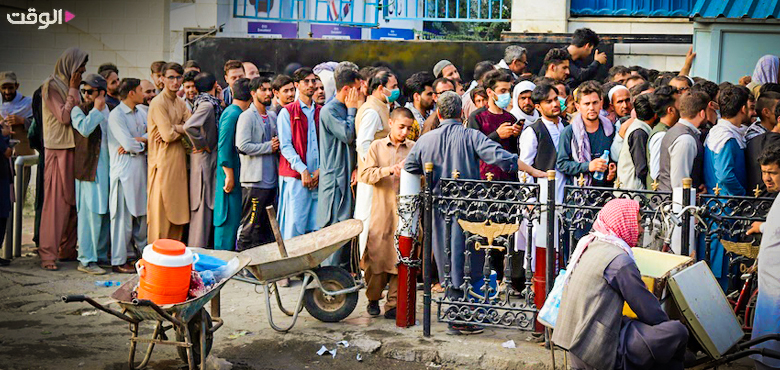Alwaght- Taliban's takeover of Kabul on August 15 not only affected Afghanistan's politics and governance but also went far to influence the already-impoverished country's economy. Although Afghanistan faced rampant economic problems before Taliban's seizure of power, after its dominance over the country as an internationally unrecognized group, the foreign aid-reliant economy of the country more than ever went crisis-hit.
Under the new circumstances, the situation is deteriorating, with the United Nations International Children's Emergency Fund (UNICEF) warning that 14 million Afghan children are at risk of starvation, with one million likely to starve to death. There is also evidence that Afghanistan's financial and banking payment system is in crisis and that it is likely to collapse. Moreover, national currency has depreciated at an unprecedented rate. The value of each US dollar has risen to 95 afghanis, bringing the value of the Afghan national currency, the afghani, against the dollar to its lowest level in two decades. What is causing this collapse?
Washington's direct role in the economic crisis
Undoubtedly, any stable and efficient economic system requires a disciplined and healthy bureaucratic structure. The US occupation of Afghanistan in 2001 not only did not lead to the establishment of a stable bureaucratic system but also it created fragmentation, corruption, and disorder in the various administrative layers of the country. In the new situation under the Taliban administration, Washington continues to play a destructive role, weakening the Afghan government and its bureaucratic structure. Behind-the-scenes agreements among the US special envoy to Afghanistan Zalmai Khalilzad, Pakistan, and the Haqqani Network, as a pro-negotiation branch of the Taliban, have made it impossible to form an inclusive government after the overthrow of President Ashraf Ghani's government, and the political and bureaucratic system and army have collapsed. In such a situation, it seems necessary that Afghan rulers have to work for years to establish a disciplined bureaucratic system.
Frozen money and assets deteriorating the economic crisis
Another factor exacerbating the economic crisis in Afghanistan is the freezing of the country's foreign assets after the Taliban took control of Kabul. In the current situation, the national currency is depreciating and bank reserves are depleted. In order to preserve the value of the Afghan currency, the Taliban have banned foreign currency transactions. Also, according to the International Monetary Fund, the dollar reserves of Afghan banks are declining, and if the Taliban administration fails to inject cash into the market, the country's banks may end up closing down.
Under such circumstances, the group has begun efforts to free its blocked assets in the US and other countries. The Taliban are also trying to persuade the international community to continue providing financial assistance to cash-strapped Kabul. The acting Minister of Foreign Affairs of the Taliban Amir Khan Mottaqi in an "open letter" to the US Congress called for the release of the blocked hard currency reserves of Afghanistan, only to find the US response negative.
Washington has responded to the Taliban letter to Congress, warning that it would cut off aids if the group exerts force to rule Afghanistan. The State Department called for an inclusive government, recognition of women's rights including education, and respect to the minorities as Taliban's only link to the world.
World aid gates to Afghanistan closed
Another major challenge for Afghanistan at present, which has raised the concerns about famine in this country, is the closure of corridors for the delivery of international aid. Currently, Kabul Airport is closed. The international community has not taken any positive steps towards recognizing the Taliban, intensifying impacts of lack of international aids to Kabul. Unsafe and unaccessible roads for trucks to deliver food and humanitarian aids to a majority of villages is making the matters worse.
Opium poppy cultivation increase
In the middle of these tough economic conditions, and also absence of international will to send aids to the Central Asian country, concerns are growing about rising interest in cultivation of opium poppy. Despite the US promise to eradicate the illegal material farming in Afghanistan since invasion of the country in 2001, the Afghan economy remains dependent on the opium plantation and drugs production. Amid the present crunch, surveys suggest that more and more people are inclined to choose opium farming to escape hunger. Afghanistan produces around 85 percent of the global drugs, international figures suggest. Reliance on drugs sales has deep roots in the country’s history. The revenue from this trade in the current year is estimated between $1.8 to $2.7 and the financial reliance on it is expected to escalate unprecedentedly.



























